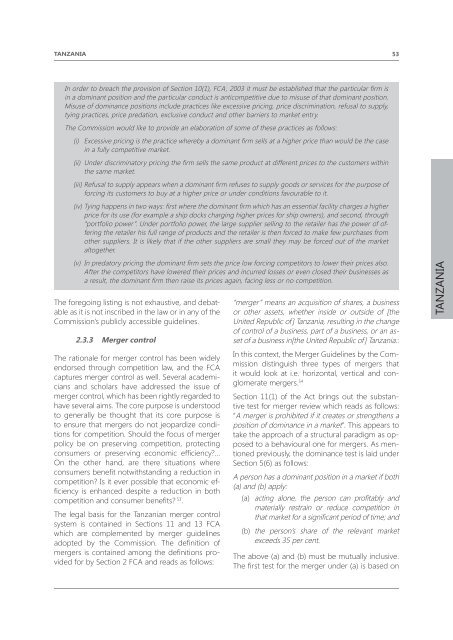a tripartite report - Unctad
a tripartite report - Unctad
a tripartite report - Unctad
You also want an ePaper? Increase the reach of your titles
YUMPU automatically turns print PDFs into web optimized ePapers that Google loves.
TANZANIA<br />
<br />
in a dominant position and the particular conduct is anticompetitive due to misuse of that dominant position.<br />
Misuse of dominance positions include practices like excessive pricing, price discrimination, refusal to supply,<br />
tying practices, price predation, exclusive conduct and other barriers to market entry.<br />
The Commission would like to provide an elaboration of some of these practices as follows:<br />
<br />
in a fully competitive market.<br />
<br />
the same market.<br />
<br />
forcing its customers to buy at a higher price or under conditions favourable to it.<br />
<br />
price for its use (for example a ship docks charging higher prices for ship owners), and second, through<br />
“portfolio power”. Under portfolio power, the large supplier selling to the retailer has the power of offering<br />
the retailer his full range of products and the retailer is then forced to make few purchases from<br />
other suppliers. It is likely that if the other suppliers are small they may be forced out of the market<br />
altogether.<br />
<br />
After the competitors have lowered their prices and incurred losses or even closed their businesses as<br />
<br />
The foregoing listing is not exhaustive, and debatable<br />
as it is not inscribed in the law or in any of the<br />
Commission’s publicly accessible guidelines.<br />
2.3.3 Merger control<br />
The rationale for merger control has been widely<br />
endorsed through competition law, and the FCA<br />
captures merger control as well. Several academicians<br />
and scholars have addressed the issue of<br />
merger control, which has been rightly regarded to<br />
have several aims. The core purpose is understood<br />
to generally be thought that its core purpose is<br />
to ensure that mergers do not jeopardize conditions<br />
for competition. Should the focus of merger<br />
policy be on preserving competition, protecting<br />
<br />
On the other hand, are there situations where<br />
<br />
competition? Is it ever possible that economic ef-<br />
<br />
53 .<br />
The legal basis for the Tanzanian merger control<br />
system is contained in Sections 11 and 13 FCA<br />
which are complemented by merger guidelines<br />
<br />
vided<br />
for by Section 2 FCA and reads as follows:<br />
53<br />
“merger” means an acquisition of shares, a business<br />
or other assets, whether inside or outside of [the<br />
United Republic of] Tanzania, resulting in the change<br />
of control of a business, part of a business, or an asset<br />
of a business in[the United Republic of] Tanzania.:<br />
In this context, the Merger Guidelines by the Commission<br />
distinguish three types of mergers that<br />
it would look at i.e. horizontal, vertical and conglomerate<br />
mergers. 54<br />
Section 11(1) of the Act brings out the substantive<br />
test for merger review which reads as follows:<br />
“A merger is prohibited if it creates or strengthens a<br />
position of dominance in a market”. This appears to<br />
take the approach of a structural paradigm as opposed<br />
to a behavioural one for mergers. As mentioned<br />
previously, the dominance test is laid under<br />
Section 5(6) as follows:<br />
A person has a dominant position in a market if both<br />
(a) and (b) apply:<br />
(a) <br />
materially restrain or reduce competition in<br />
<br />
(b) the person’s share of the relevant market<br />
exceeds 35 per cent.<br />
The above (a) and (b) must be mutually inclusive.<br />
<br />
TANZANIA

















